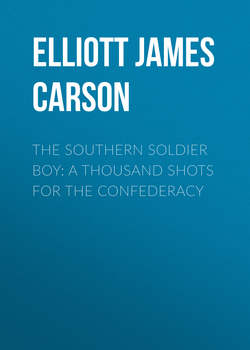Читать книгу The Southern Soldier Boy: A Thousand Shots for the Confederacy - Elliott James Carson - Страница 1
PREFACE
ОглавлениеA readable book should instruct, entertain and amuse. The author, outside of the historical interest of this little book, has aimed to cover a broad-enough field for all classes of readers to find some nourishing food – at least in the way of variety and shifting scenes – from the standpoint of a young private.
And in order to understand his viewpoint, a brief sketch of the author is admissible. Born in Cleveland County, N. C., about midway between Charlotte and Asheville, July 12, 1845. His father, a small slaveholder and a farmer, he was brought up to work on the farm and was well practiced in the use of firearms, and was well seasoned in the fox-chase and hunting sports. His father was an ardent Whig, and they got their political inspiration from William G. Brownlow’s Knoxville, Tenn., Whig. (See Brownlow’s and Pryneis’ debate on Negro slavery.) Brownlow proved conclusively that slavery was of Divine origin; that it had always existed and always would exist, because the Bible said, “The heathen you buy with your money shall never go free, but shall be an inheritance to you and your children forever.” But when hostilities began, Brownlow sided with the Union and was the War Governor of Tennessee. The war spirit ran high in our section and all the boys were eager to take a hand in the fun of chasing the invaders out of our country. The first Manassas battle started them back the way our smart men said they would go. And I thought the fun would all be over before I would have a chance to share in the glory. But they kept coming in larger swarms. After I had organized and drilled with the Home Guards, I saw there was still a prospect to get to the front in time to take a hand. Two years had dragged along, the battle of Gettysburg had turned the scale, more than half of my early in friends had been knocked out when I entered the army for a three-years’ term at the age of 18 years. We had understood at the first that we must fight three to one, but to whip that many Yankees was not thought to be much of a job; but when I waded in, it was quite evident that we must fight five to one. But we still thought they must be whipped, all the same. The numbers come up to our expectations, but we were sadly deceived in their fighting qualities. When they first came our climate did not agree with them, but the longer they stayed the harder they were to persuade away; and they finally worried us out, until we had to let them alone; and after staying with us awhile we learned they are as good as we are. From a distance, they are inclined to view us with a critic’s eye, as through a glass darkly; but when they come down and bring their washing, they get a clearer view. Then, and not until then, the veil is removed away, and all our problems stand revealed in open day. Progress comes through evolution and revolution; where moral forces lag physical force compels the way. The only issue now is in patriotic rivalry of the sections. The heritage of one is the property of all.
“Oh! carry me back to old Virginia,” “The old Kentucky home,” “Carolina,” “Oh, for Carolina,” “Away down in Georgia,” “On the Sewanee River,” etc., are refrains not equaled in the more frigid region. Then we have “Dixie,” covering the whole Southland. All these are now held in common by our whole people. Whoever heard of any one ever wanting to be carried back to New England, where the natural resources are mainly ice, granite, rock, codfish and beans. Still we are all proud of the hardy New Englander who makes the desert blossom as the rose wherever he pitches his tent. His hard environment has been a blessing to every other part of the country, forcing him to seek greener pastures in balmier climes, and to disseminate his energy and frugality in those more leisureful sections that need encouragement to greater thrift. It was the combined qualities of the Virginia cavalier and the New England Puritan that made Stonewall Jackson invincible and Robert E. Lee the highest type of the American patriot.
